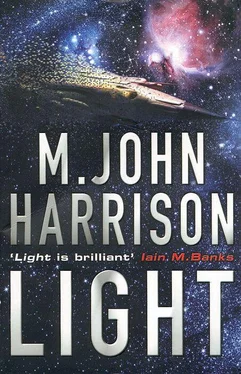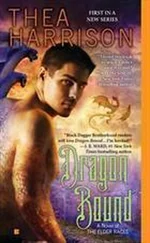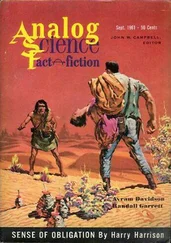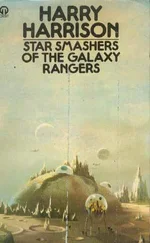'Do you see her too?' he asked Vesicle.
'I don't know,' said Vesicle listlessly.
Ed Chianese looked down at the woman, and she looked up at him. There was something so wrong with her face. From one angle it looked beautiful in that oval, high-cheekboned oriental way. Then she turned it, or Ed altered his angle on her, and it seemed to blur and shift into a yellow and wrinkled old age. It was the same face. There was no doubt about that. But it was always moving, always blurred. Sometimes it was old and young at once. The effect was extreme.
'How are you doing that?' Ed whispered.
Without taking his eyes off her he extended a hand towards Tig Vesicle. 'Give me the gun,' he said.
'Why?' Vesicle said. 'It's mine.'
Ed said carefully: 'Give me the gun.'
The woman got out a little gold case, which she opened, and took from it an oval cigarette.
'Do you have light?' she said. 'Ed Chianese?'
She stared up at him, her face blurring and shifting, blurring and shifting. A sudden flurry of sleet went round them both, hot orange sparks off the anvil of circumstance. Ed took the Hi-Lite Autoloader out of Tig Vesicle's hands and fired it point-blank.
'Right between the eyes,' he would say later. 'I shot her point-blank, right between the eyes.'
Nothing happened for a moment. She continued to stand there, looking up at him. Then she seemed to disassemble herself into a stream of tiny, energetic golden motes, which poured away from the point of impact to join the sparks of the rain. First her head dissolved, then her body. She burned away quite slowly, like a firework consuming itself to make light. There was no sound at all.
Then Ed heard her voice, an echoing whisper.
'Ed,' she said. 'Ed Chianese.'
The street was empty again. Ed looked down at the gun in his hand, and up from the gun at Tig Vesicle, who was staring into the sky, his face tilted so that rain fell into his open mouth.
'Jesus Christ,' Ed said.
He put the gun away and they both began to run. After a minute or two, Ed stopped and leaned against a wall. 'I'm not up to this,' he said. 'Are you?' He wiped his mouth. 'I hate the fucking dry heaves.' He looked dizzily up at the stars. They were like sparks, too, rushing and pinwheeling across the sky to coalesce, just above the warehouse roofs, into the roseate blur of the Tract. This reminded Ed of something he had been meaning to ask. 'Hey,' he said. 'What planet am I on?'
Vesicle stared at him.
'Come on,' Ed said. 'Be fair. Anyone can have a problem with that.'
New Venusport, Earth's original outpost in the halo:
The military cities sprawled across the southern hemisphere. They were less cities than EMC compounds, run as free-trade zones, pulling in migrant labour from across the halo the way a black hole rips gas out of an accretion disc. They drew the defeated races. They drew the enfeebled and stupid. They drew the New Men, like moths to a flame. You went to New Venusport because you had nowhere else to go.
South hemisphere New Venusport was essentially a maintenance operation. K-ships filled its skies, or shot vertically into orbit at Mach 50. Night and day they crouched in the service bays with arc-light slicking down their dark grey flanks. They were restless. They flickered in and out of visibility as their navigation systems trawled through ten spatial dimensions. They never disconnected their defences or target-acquisition systems, so the air around them was constantly cooking with everything from gamma to microwaves. Work near them, you were in a lead suit. Even the paint on their hulls was deadly. The maintenance bays weren't all of it: elsewhere, EMC's resource contractors had the south hemisphere regolith up in strip-mines as wide as nation-states, using machines powered and directed by the old alien technology. They switched on, stood back, stared at one another in delighted surmise.
'Hey, this thing could peel a planet! '
In the cities, air and food were foul, and you had no idea what came down in the rain. The New Men, packed into their warrens, preyed upon by the usual portfolio of gangsters, high-profile political zealots and EMC police, went off to work in the grey dawn, coughing and shivering and bemused, awkwardly hunching their shoulders. But it wasn't all bad. New corporate workplace safety guidelines, self-imposed and self-policed, had brought the life expectancy of a male worker up a couple of points, to twenty-four years. Anyone could tell you that was an advance.
Meanwhile, scattered across the northern hemisphere, the corporate enclaves constructed themselves as Old Earth.
They favoured little towns-with little market squares-called Saulsignon or Brandett Hersham; little clean railway trains running through fields of chocolate-coloured ploughland. The men from EMC chose tall, beautiful women and gave them honey-coloured winter coats of real fur. The women chose men from upper management, whom they loved with a fierce mad true devotion, and gave them beautiful children with honey-coloured hair. There were grey stone churches with witch's hat steeples, chateaux and shooting boxes. Water meadows lined the tributaries of the New Pearl River-there were wild flowers all summer, long, frozen floods a mile wide to skate on every winter. You went to New Venusport if you were lucky, and a hard worker. The corporation sent you there to do a job, but you went for the blue rainwashed skies and white cumulus clouds. The horses, so beautifully groomed. The country sports. And there was such good food in Saulsignon-all those different cheeses!
New Venusport, the recruiting brochures said: Planet of choice.
The warren took up an entire block, bounded by the docks on two sides, the waste lot of some old industrial accident on a third, and on the fourth Straint Street, the western boundary of the garment district.
Inside, it was always lighted, but only by the hologram channels, or with lamps designed for New Men eyes: so that what actually reigned was a kind of grey-blue twilight, like the light of some antique monitor. Inside, it was crowded and hot, a chaos of plywood cubicles with no doors. These cubicles weren't joined by corridors. You never knew where you were. To get from one to the next, you went through a third. You could go through thirty small rooms to get to an outside door. Sometimes they had been partitioned further.
'Well, this is home,' said Tig Vesicle.
Ed Chianese, shaking with tank withdrawal, looked around.
'Nice,' he said. 'It's nice.'
Inside the rooms, there would always be eight or nine people doing something, you couldn't quite tell whether it was cooking or laundry. Sometimes there would be more. They had a smell about them that was hard to describe: it was like cinnamon mixed with lard. They slept on mattresses right there on the floor. The men kicked their legs out in that awkward way they had, so it was impossible not to trip over their feet as you picked your way through: they looked up for a second from masturbating, eyes as empty and reflective as the eyes of animals in the odd grey light. The women did their hair in a kind of soft short fluff over their rather beautiful oval skulls. They wore sleeveless cotton frocks in ochre colours, which fell from the shoulders with no style whatsoever. They had a body language which said that if they didn't keep busy it would be too easy to remember where they were. Kids ran about everywhere, pretending to be K-ships. Popular posters of the Kefahuchi Tract were taped up on every wall. The New Men had some kind of cult, centred round the idea that this was where they had originated. It was as sad as everything else about them. Every child knew where they came from, and it wasn't there.
Eventually Tig Vesicle stopped uncertainly, in a cubicle that looked like all the others.
Читать дальше












